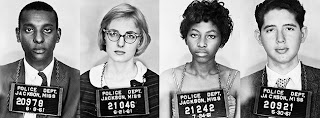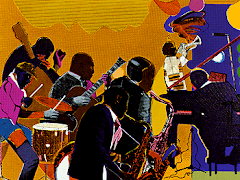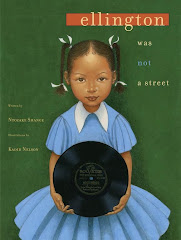 |
| Painting By Charlotta Jansen |
I was just about to kick myself because I missed the January deadline to be able to participate and follow the route, both physically and emotionally, of the Freedom Riders. But you had to be a college student to be considered and I'm still in high school. As part of the 50th anniversary of the Freedom Riders, PBS is doing something big and meaningful. This is what its program American Experience is doing: “In May 2011, forty college students will embark on a journey retracing the route of the original 1961 Freedom Rides and beginning an important national conversation about the role of civic engagement today. The ten-day, all-expenses-paid trip is a unique opportunity for college students who are committed to learning from history and to applying those lessons today.” American Experience selected college students with a broad range of backgrounds– lending diverse voices to the journey. Students will share their experiences and learn from their peers, from pioneers in the civil rights movement, and from today’s civic leaders. "
Who were the Freedom Riders? Get ready to learn some Constitutional Law. "Boynton v. Virginia, 364 U.S. 454 (1960) was a decision by the Supreme Court of the United States. The case overturned a judgment convicting an African American law student for trespassing by being in a restaurant in a bus terminal which was "whites only." It held that racial segregation in public transportation was illegal because such segregation violated the Interstate Commerce Act, which broadly forbade discrimination in interstate passenger transportation. It moreover held that bus transportation was sufficiently related to interstate commerce to allow the United States Federal government to regulate it to forbid racial discrimination in the industry. The majority opinion was written by Justice Hugo Black.
Who were the Freedom Riders? Get ready to learn some Constitutional Law. "Boynton v. Virginia, 364 U.S. 454 (1960) was a decision by the Supreme Court of the United States. The case overturned a judgment convicting an African American law student for trespassing by being in a restaurant in a bus terminal which was "whites only." It held that racial segregation in public transportation was illegal because such segregation violated the Interstate Commerce Act, which broadly forbade discrimination in interstate passenger transportation. It moreover held that bus transportation was sufficiently related to interstate commerce to allow the United States Federal government to regulate it to forbid racial discrimination in the industry. The majority opinion was written by Justice Hugo Black.
The significance of Boynton was not so much in its holding — it managed to avoid deciding any Constitutional questions in its decision, and its expansive reading of Federal powers regarding interstate commerce was also well established by the time of the decision — but the outlawing of racial segregation in public transportation led to a movement called the Freedom Rides, in which African Americans and whites together rode various forms of public transportation in the South to challenge local laws or customs that enforced segregation." ( Source Wikipedia).
So look out for events celebrating this movement and honoring these brave and conscientious YOUNG Americans. Here's the link to follow this amazing project.



























No comments:
Post a Comment